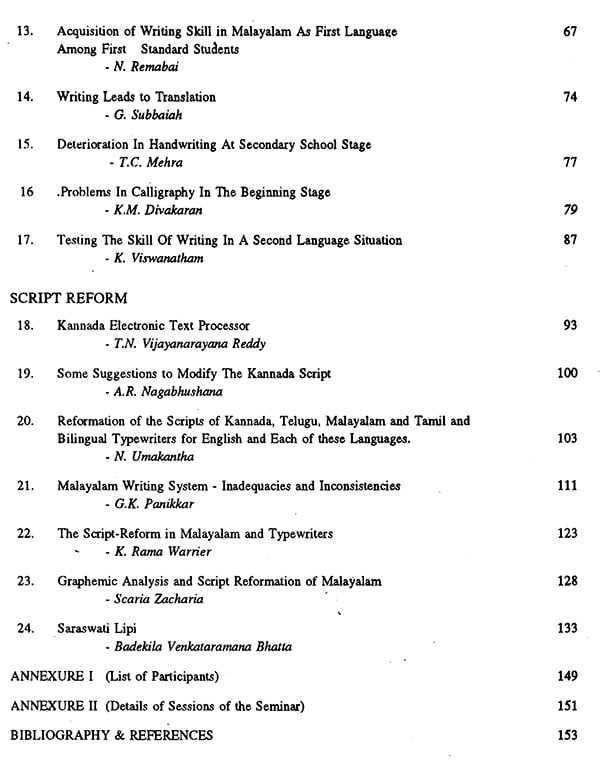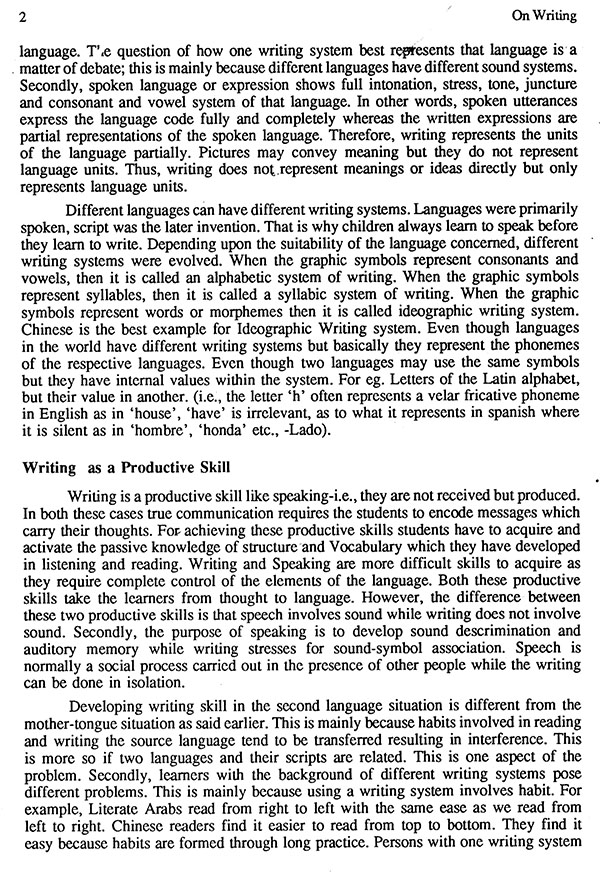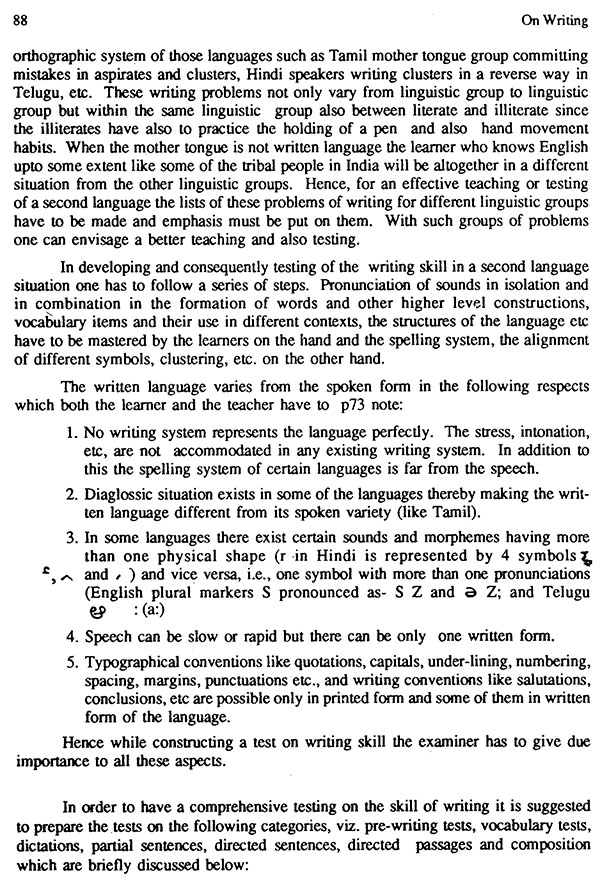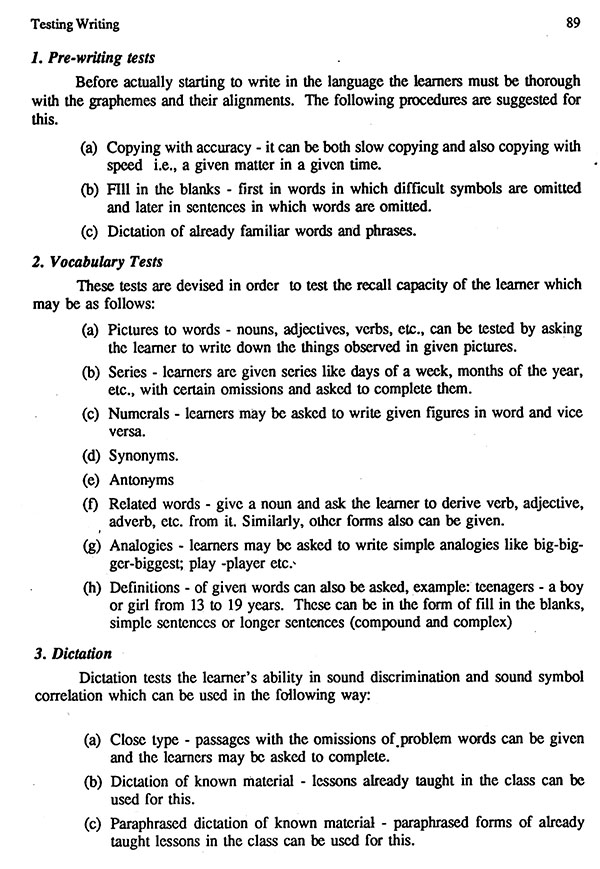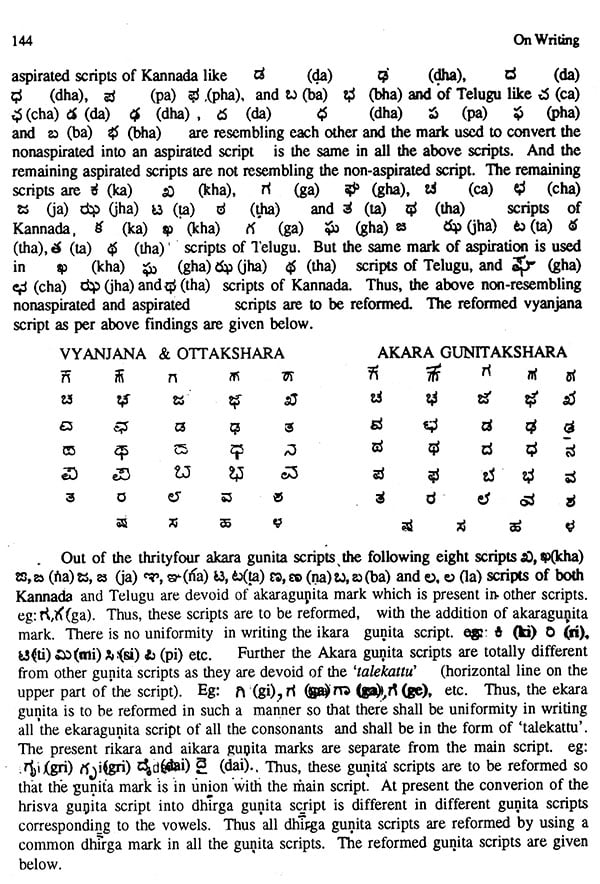
On Writing (An Old and Rare Book)
Book Specification
| Item Code: | NAX318 |
| Author: | K.P. Acharya |
| Publisher: | Central Institute Of Indian Languages, Mysore |
| Language: | English |
| Edition: | 1997 |
| Pages: | 156 |
| Cover: | PAPERBACK |
| Other Details | 10.00 X 7.00 inch |
| Weight | 280 gm |
Book Description
The Central Institute of Indian Languages was established on 17th July 1969 to help evolve and implement the language policy of the Government of India and coordinate the development of Indian languages. In addition to this, the Institute is charged with the responsibility of conducting research in the areas of language analysis, language pedagogy, language technology and language use in society, Government and education with a bias towards problem solving and national integration.
As part of the implementation of three language formula the Regional Language Centres impart training in different regional languages to the graduate teachers deputed by various State Governments.
The major work of the Institute and its Regional Language Centres may be grouped as research, materials production, teaching and conducting orientation programmes. Materials also produced by conducting seminars/workshops. The present volume is the result of one of a such seminars/workshops conducted in the Southern Regional Language Centre, Mysore. "
The various aspects of ‘writing’ which is one of the four basic skills the language learner has to develop, were discussed in the seminar. The papers were revised thoroughly by the authors taking into account the latest theoretical developments in the areas of second language learning/teaching.
Developing Writing Skill in any Language teaching Learning situation has to be done systematically starting from script learning to the composition. Teaching Writing involves formation of letters/alphabets, reproduction, combination thereof guided Writing and free writing. Testing Writing in second language situation has to take account of different categories of testing the Writing skill such as pre-writing tests, vocabulary tests, dictations, directed sentences and composition. The chapter on script reform has given different suggestions for the improvement of the existing scripts from the point of view of technology and economy such as the suggestion of Bilingual typewriter and electronic test processing system and common script for South Indian Languages.
I am happy to record that co-ordinator Dr. K.P. Acharya has taken up action in editing the papers and bringing out this volume. If scholars working in the areas of Applied Linguistics and "Writing" in particular find this volume to be useful and motivating, the aims and goals of the seminar and the proceedings thereof would be considered worthy and useful.
I congratulate the Editor of this volume and the Southern Regional Language Centre for their academic endeavours in the area of Language teaching and applied Linguistics.
‘Writing is one of the two media for human communication viz., Writing and Speaking through which "meaning" is conveyed. The history of Writing system traces its origin back to the year 3500 B.C. and prior to that no script was in existence and the whole human communication system took place only through oral medium. The oral tradition has several merits in comparison to the written medium although the latter has its Own merits. However, ‘meaning’ could be better conveyed through the oral communication system but the major problem involved is the storage of information and retrieval. On the other hand, the written medium of communication has the benefits of the long term storage and retrieval and hence several scholars have assigned more importance to the written communication system.
In the context of language teaching, writing is one of the four primary skills viz., Listening, Speaking, Reading and Writing. While language teaching -- whether it be Mothertongue, Second Language or Foreign Language--starts with the development of oral skills and it is only subsequently that the written skills are introduced; oral and written skills are complementary to each other in the task of teaching/learning a language.
The spectrum of "Writing" is very wide and ranges from the formulation of an alphabet to the development of written discourse and longer texts. The importance and effectiveness of writing is based upon the observation of characteristics like coherence, cogency and precision. These features can be better inducted into the written mode of communication rather than ural medium. Thus, in the development of writing skill in any language teaching/learning situation, large number of aspects are required to be covered starting from the hand movements, formation of the correct shapes of letters and the combinations thereof, formation of words, phrases, clauses and sentences, paragraphs, essays and discourses, text books and critical and creative writings. Each of these aspects involve a number of techniques to be developed among the language learners. Therefore, writing is considered to be one of the basic skills of language and it is only this concept that made the Southern Regional Language Centre hold a Seminar on Writing wherein a wide range of topics were covered through a number of scholarly research papers.
There are twenty-four papers presented in the seminar which have been very carefully classified by my colleague Dr. K.P. Acharya who deserves whole-hearted congratulations for co-ordinating the Seminar and editing the proceedings thereof.
Dr. K.P. Acharya has skillfully classified the papers into four sections, viz.., Developing Writing Skill, Teaching of Writing, Testing of Writing and Script Reform.
It is hoped that the Seminar Proceedings will be found useful and informative tc: those scholars who are interested in language teaching in general and the development of writing skill in particular. The centre would consider the Seminar and Proceedings to be successful! if the readers find the volume to be useful not only in providing information on the topic but motivating others to undertake further research in the direction. The Centre expects and would be happy to receive comments, criticisms, observations and guidelines for the improvement of the volume deserve compliments for the hard work and intensive research findings brought out in their papers.

